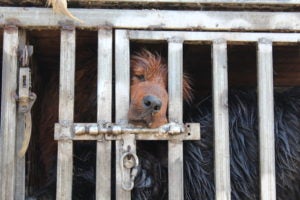
BEIJING — China’s city of Shenzhen has just passed a ground-breaking law to ban the consumption and production of dog and cat meat, the first city in mainland China to do so. The ban has been welcomed by long-time anti-dog meat trade campaigners Humane Society International as a watershed moment in efforts to ban the trade across China. The law also addresses the wildlife trade.
The food safety legislation (Shenzhen Special Economic Region Regulation on a Comprehensive Ban on the Consumption of Wild Animals) proposed in February by Shenzhen legislators, comes into effect on May 1. Unlike the temporary ban on wildlife markets and consumption passed by the national government, Shenzhen’s ban is a permanent prohibition on the consumption, breeding, and sale of wildlife such as snakes, lizards, and other wild animals for human consumption, with heavy fines of up 150,000 yuan.
Although advanced in response to the coronavirus outbreak, an unrelated ban on the consumption of “pet” animals was also included in acknowledgement of their status as companion animals. In announcing the ban, a spokesperson for the Shenzhen government said “… dogs and cats as pets have established a much closer relationship with humans than all other animals, and banning the consumption of dogs and cats and other pets is a common practice in developed countries and in Hong Kong and Taiwan. This ban also responds to the demand and spirit of human civilization.”
To further underpin that, the law clarifies those species permitted to be consumed (pig, cattle, sheep, rabbit, chicken etc, with dogs and cats noticeably absent). Therefore from May 1, the sale of cats and dogs for human consumption will now be banned in restaurants and stores throughout Shenzhen, and sale of live cats and dogs for consumption will be banned in markets.
Dr Peter Li, China policy specialist for animal protection charity Humane Society International, welcomed the news, saying: “With Shenzhen taking the historic decision to become mainland China’s first city to ban dog and cat meat consumption, this really could be a watershed moment in efforts to end this brutal trade that kills an estimated 10 million dogs and 4 million cats in China every year.
The majority of these companion animals are stolen from people’s back yards or snatched from the streets, and are spirited away on the backs of trucks to be beaten to death in slaughterhouses and restaurants across China. Shenzhen is China’s fifth largest city so although the dog meat trade is fairly small there compared with the rest of the province, its true significance is that it could inspire a domino effect with other cities following suit. Most people in China don’t eat dog or cat meat, and there is considerable opposition to the trade particularly among younger Chinese. Although World Health Organization advice is clear that dogs and cats pose no known coronavirus threat whatsoever, it’s no surprise that attention is turning to this trade at this time because it undoubtedly poses a huge human health risk for other diseases such as rabies, as well as causing immense animal suffering.”
Dr. Teresa M. Telecky, vice president of the wildlife department for Humane Society International, said: “Shenzhen is the first city in the world to take the lessons learned from this pandemic seriously and make the changes needed to avoid another pandemic. People around the world are suffering the impact of this pandemic because of one thing: the wildlife trade. Shenzhen’s bold steps to stop this trade and wildlife consumption is a model for governments around the world to emulate. We urge all governments to follow suit by banning wildlife trade, transport and consumption for any purpose.”
Shenzhen ban details
- Article 2 prohibits the consumption of state-protected wild animals and other terrestrial wild animals taken from the wild, as well as captive bred and farmed terrestrial wild species.
- Article 3 makes clear that the consumption of “pet” animals such as cats and dogs is not permitted; species that are permitted to be consumed include pig, cattle, sheep, donkey, rabbit, chicken, duck, goose, pigeon, quail and other livestock animals on the list that are raised for food, as well as aquatic animals who are not banned by other law or regulations.
- Article 8: prohibits the consumption of animals farmed for medicinal purposes.
- Article 17. The production or marketing (sale) of the above mentioned state-protected wild species and their products for consumption purposes will be fined between 150,000 yuan and 200,000 for a value of illegal activity that is under 10,000 yuan; and a fine of between 20 times and 30 times of the value of an illegal activity that is 10,000 yuan or above. For violations involving other wild animals whose value is less than 10,000 yuan, there will be fines between 100,000 yuan and 150,000 yuan.
Facts about China’s dog meat trade
- Thirty million dogs a year are killed across Asia for meat. There are estimated to be more than 91.49 million dogs and cats kept as pets in China. An estimated 10 million dogs a year are killed for China’s dog meat trade.
- The World Health Organization warns that the dog trade spreads rabies and increases the risk of cholera.
- Most people in China don’t eat dogs, in fact dog meat is only eaten infrequently by less than 20% of the Chinese population. A 2017 survey revealed that even in Yulin, home of the notorious dog meat festival, most people (72%) don’t regularly eat dog meat despite efforts by dog meat traders to promote it. Nationwide across China, a 2016 survey conducted by Chinese polling company Horizon, and commissioned by Chinese group China Animal Welfare Association in collaboration with Humane Society International and Avaaz, found that most Chinese citizens (64%) want to see an end to the Yulin festival, more than half (51.7%) think the dog meat trade should be completely banned, and the majority (69.5%) have never eaten dog meat.
Download video and photos of China’s dog meat trade here.
ENDS
Media contact: Wendy Higgins, whiggins@hsi.org






